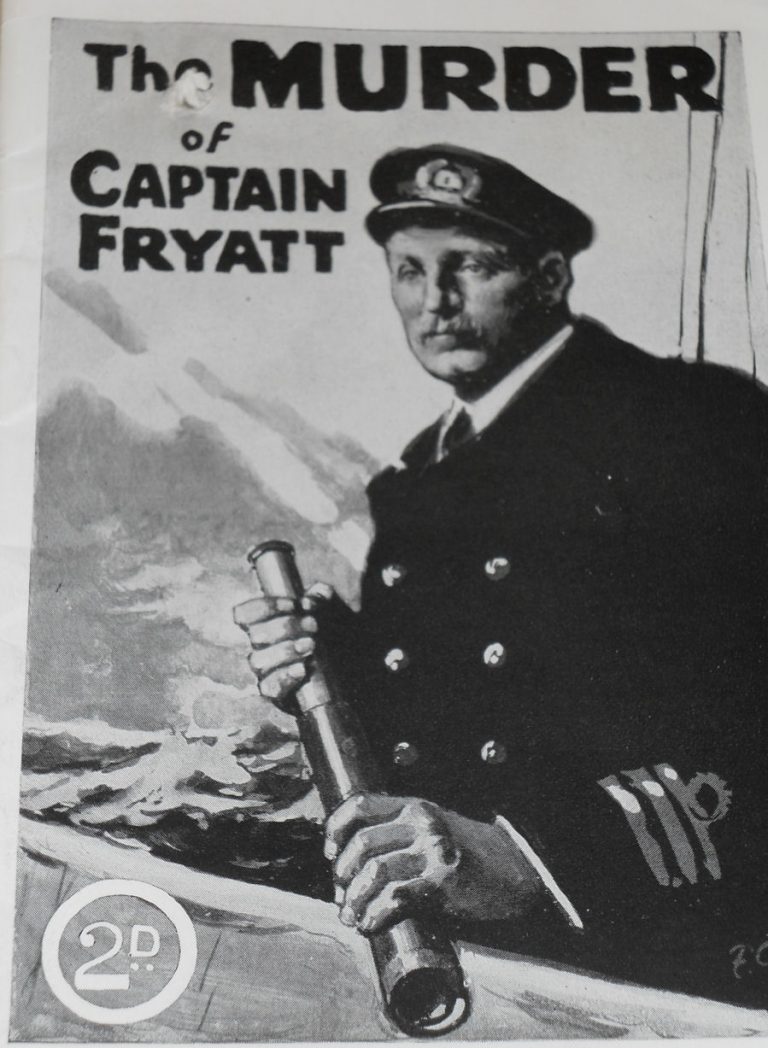
Front cover of booklet (catalogue reference: MT 9/1066)
On 27 July 1916, Charles Algernon Fryatt, the Captain of the SS Brussels – a passenger ferry that ran between Harwich and neutral Holland – was executed by the Germans. He was only the second British civilian to be executed during the war; the other was nurse Edith Cavell, who was shot on the morning of 12 October 1915.
At the time, the executions of Cavell and Fryatt caused international outcry; their funerals were attended by thousands of enraged and patriotic mourners. While Nurse Cavell is now considered a martyr and a victim of German barbarism, the case of Captain Fryatt has all but disappeared from public consciousness.
This blog describes the events leading up to the execution of Captain Fryatt and explores the British government’s response to ‘this atrocious crime’. The death of Captain Fryatt also holds a personal dimension as my wife Rachel Fryatt is related to Captain Fryatt on her father’s side.
Charles Fryatt was born in 1872 and on leaving school joined the merchant navy. He quickly rose through the ranks and in 1915 became master of the SS Brussels, a Great Eastern Railway ship that sailed between the ports of Harwich and Rotterdam.
In February 1915, following the outbreak of the First World War, the German government announced that merchant ships operating in British waters would be attacked without warning. This was no idle threat. In March 1915, the SS Wrexham was attacked by a German U-boat and chased for 40 nautical miles into the port of Rotterdam. On 28 March 1915, the British steamship RMS Falaba was torpedoed and sunk by a German U-boat, resulting in the death of 104 people including one American passenger (ADM 137/3117).
On the same day that the Falaba was sunk, the SS Brussels was approached by a German submarine during a routine trip to Rotterdam and ordered to stop. Rather than give up his ship, Captain Fryatt ordered the crew to proceed at full speed and attempted to ram the submarine, forcing it to crash dive to avoid destruction.
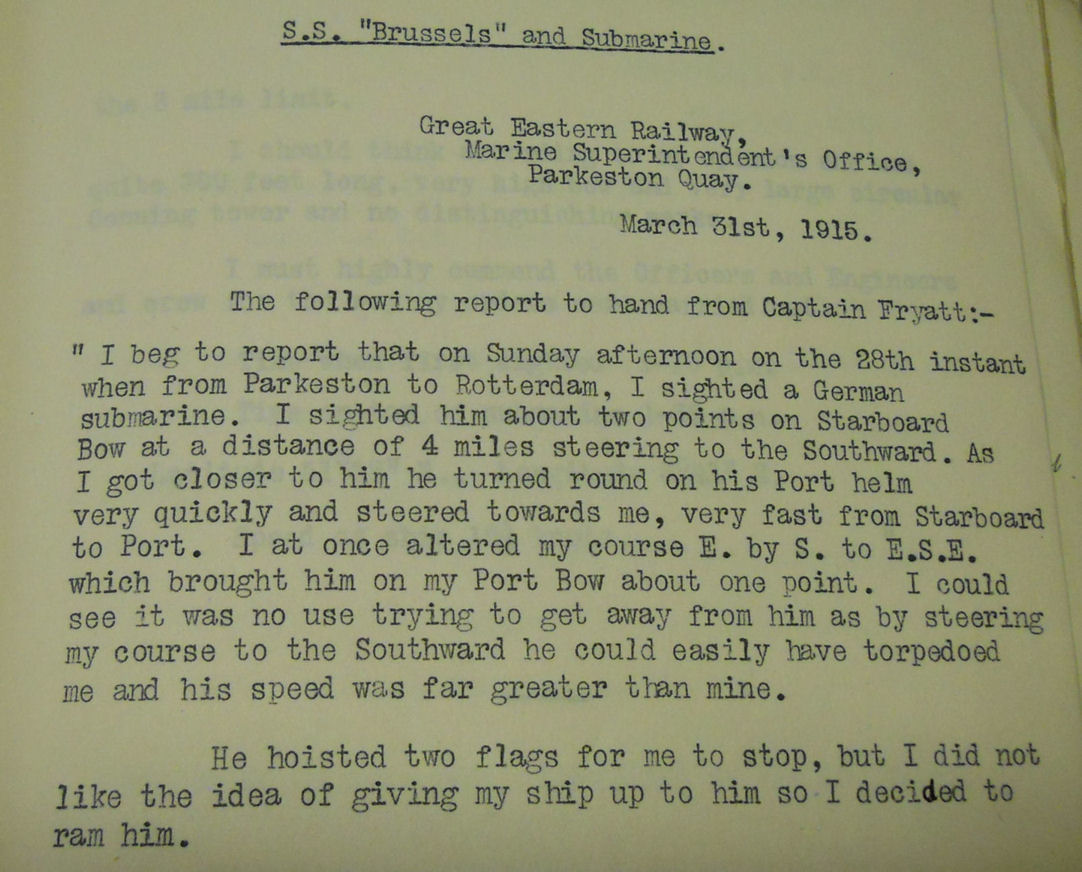
Fryatt’s report of the encounter with a German submarine (catalogue reference FO 383/195)
In ensuring the safety of his ship and crew, Captain Fryatt was awarded a gold watch by the Admiralty. His exploits were also mentioned in Parliament, with both party leaders praising his courage and determination in the face of enemy attack. Following the encounter with the submarine, Fryatt returned to normal duties.
Over a year later, on 22 June 1916 the Brussels, loaded with foodstuffs and a party of Belgium refugees, set sail from the Hook of Holland bound for Tilbury. No sooner had it left Dutch waters, the ship was surrounded by five German destroyers. Fryatt was ordered to stop; the ship was then boarded and taken to Bruges in occupied Belgium.
The Germans were intent on revenge and on 16 July charged Captain Fryatt with attempting to sink a German submarine. He was a non-combatant, and was accused of being a ‘franc tireur’ – a civilian engaged in hostile military action. Fryatt was tried before a Court Martial on 27 July at Bruges Town Hall. He was found guilty and sentenced to death. He was executed by firing squad at 19:00 the same evening, shot in the Jardin de l’Aurore next to the barracks on the eastern edge of Bruges. He was 43 years old and left a wife and seven children. His death was officially confirmed in a telegram sent from the American Ambassador to Lord Grey, the British Foreign Secretary.
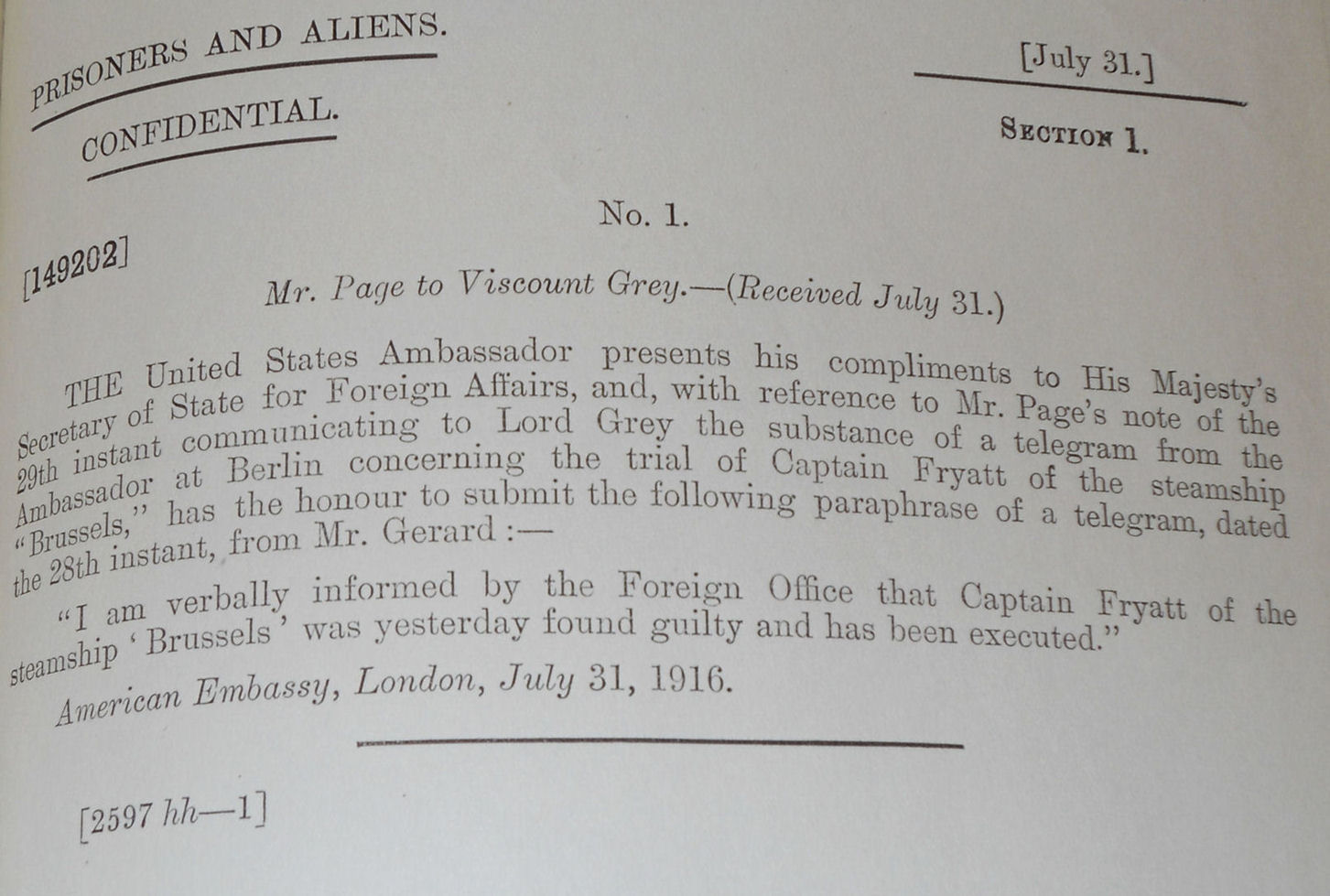
Telegram received from the US Ambassador (catalogue reference FO 383/195)
The news of the trial and death sentence caused a storm of protest. The British Prime Minister, Herbert Asquith, described the execution as an atrocious crime against international law that clearly demonstrated that Imperial Germany had adopted a policy of terrorism. This view was echoed by the First Lord of the Admiralty, Arthur Balfour, who claimed that Fryatt’s death was a calculated act of ferocity that amounted to judicial murder.
On Sunday 6 August, a large crowd gathered in Trafalgar Square to protest against Fryatt’s murder and heard a demand from his widow, that ‘the perpetrators of this foul crime on my dear husband be punished’. The War Cabinet agreed and considered the confiscation of all German property in the United Kingdom as a reprisal for the murder of Captain Fryatt (CAB 42/17/1).

Eye witness account of the execution of Captain Fryatt (catalogue reference ADM 137/3148)
To honour the sacrifice made by Captain Fryatt, a national memorial fund was opened with the Great Eastern Railway awarding his widow a pension of £250 per year. The Dutch branch of the League of Neutral States presented the company with a memorial tablet which was installed at Liverpool Street Railway Station. The memorial, which still has pride of place on the concourse, was officially unveiled on 27 July 1917 to mark the first anniversary of captain Fryatt’s execution. The incident inspired a silent film, ‘The Murder of Captain Fryatt‘ (1917), starring Harrington Reynolds and Olive Proctor as the Captain and his wife. A Public House in Parkeston, a wing at Dovercourt Cottage Hospital and a mountain in Canada were also named in Captain Fryatt’s honour.
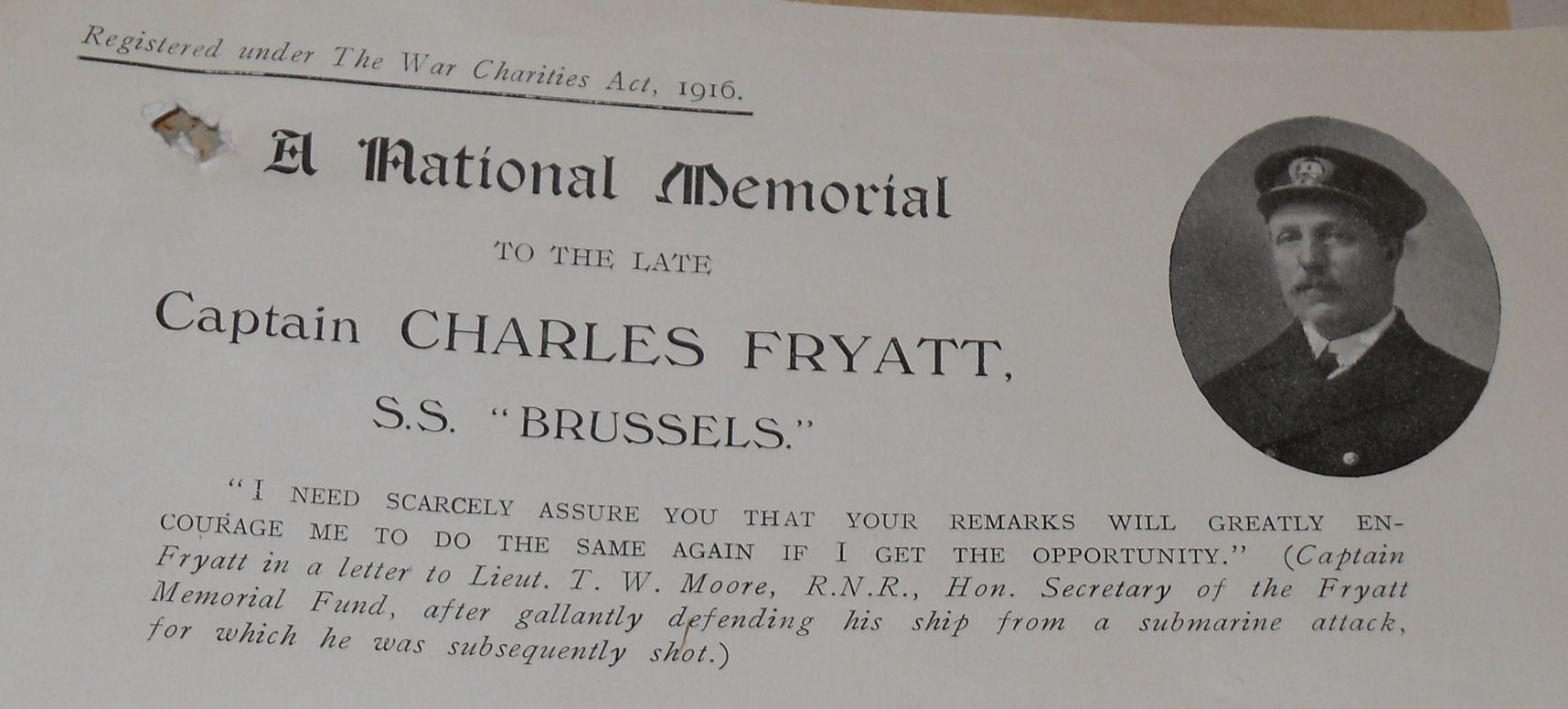
Memorial fund appeal (catalogue reference MT 9/1066)
In July 1919, following the end of the First World War, the body of Captain Fryatt was exhumed from the cemetery near Bruges and returned to Britain aboard the destroyer HMS Orpheus. The coffin was draped in the Union flag and guarded by four bluejackets with fixed bayonets. Following its arrival at Dover, the coffin was transported by rail to Charing Cross Station. It was then solemnly placed on a gun carriage and provided with a naval escort for the short journey to St Paul’s Cathedral for a state funeral. Following the service, attended by the Prime Minister and War Cabinet, the funeral cortege led by drummers from the Royal Marines made its way to Liverpool Street Station. Thousands of people crowded the pavement many of whom were merchant seamen and their families who wished to pay their last respects. (HO 45/10903/382997)
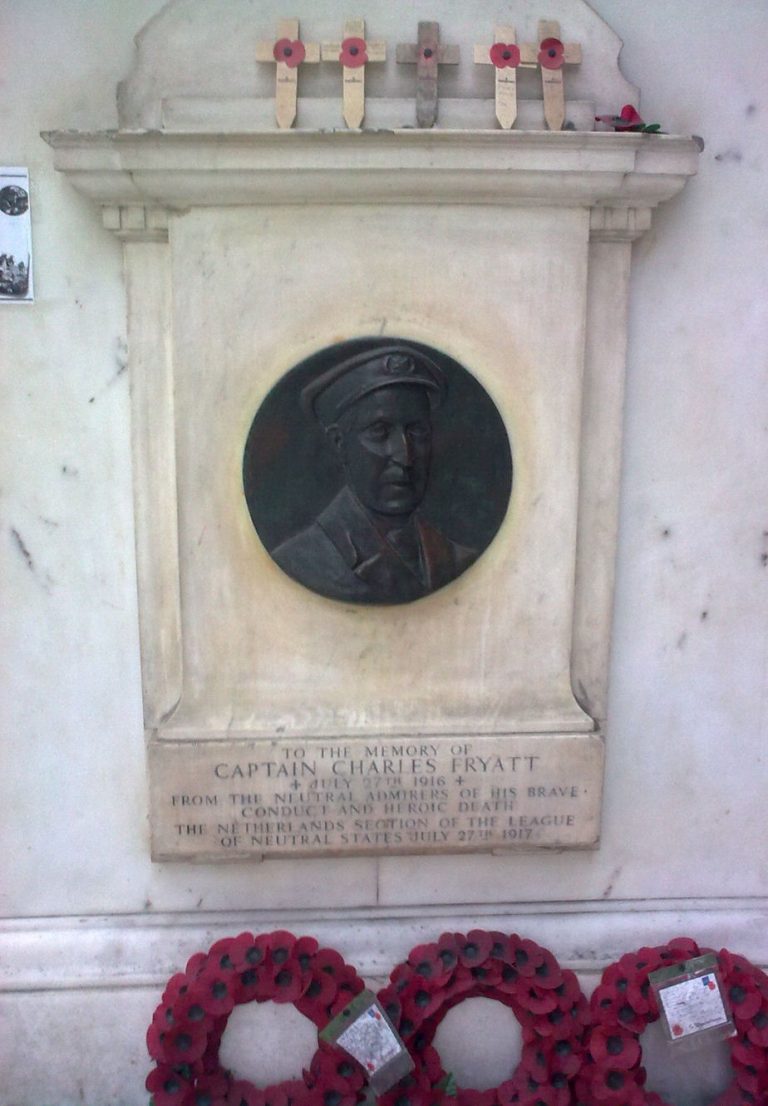
Memorial to Captain Fryatt at Liverpool Street Station
The body of Captain Fryatt was finally laid to rest in the graveyard of All Saint’s Church, Upper Dovercourt, Harwich where it overlooks the harbour. The interment was presided over by the Bishop of Chelmsford who compared the sacrifice made by Captain Fryatt to those of Edith Cavell and Jack Cornwall, who was killed in the Battle of Jutland aged 16 years. As the coffin was lowered into the grave buglers sounded the last post. The inscription on the headstone reads:
‘In Memory of Captain Charles Algernon Fryatt, Master of the Great Eastern Steamship Brussels, illegally executed by the Germans at Bruges on 27 July 1916.’
After the war, an Committee of Enquiry was established to look into the incident (CAB 24/85/6). Those responsible for the death of Captain Fryatt were never brought to justice.
Good to see a wreath from Abellio Greater Anglia laid at the shrine of Captain Fryatt, in the booking hall of Liverpool Street Station, exactly one hundred years to the day since the unfortunate Master Mariner was executed by the German Navy as an atrocious war criminal.
If I remember correctly there was a tv programme about Captain Fryatt.
Yes there was, Ian Hislop presented a programme called ‘Not Forgotten’ where they talked about Captain Fryatt. My Mum and Grandad spoke in the programme and at the start when Ian came to our house, I’m the little girl that opens the door. Captain Fryatt was my Great-Great Grandad, we’re a very proud family ☺️
He’s not entirely forgotten. I’m a train driver that frequently drives into Liverpool Street station and I and some of the other drivers take the opportunity to go up to the war memorial to pay our respects. I’m happy to tell you that we often see passengers there for the same reason and I once saw a walking tour guide telling his party Captain Fryatt’s story.
In Zeebrugge on the road from the old Mole to Bruges where it crosses the coast road from Blankenberge to Knokke there is the Café Fryatt which I used to frequent 68 – 72. The Museum to the Zeebrugge raid on 23 Apr 18 is 150 mtrs away.
My father (Horace), an Australian of Geelong, Victoria, in his very early 20s served on British merchant ships in the Indian Ocean and Atlantic between 1916-18. In particular, he served on crowded troop ships making hasty dashes between England and France. He liked to recall a humouress experience when sitting on a toilet the submarine alert sounded and his ship began making even more alarming manoeuvres to evade the enemy ! Not so funny, his wartime service left him left him with an injury which necessitated wearing a steel belt for the rest of his working life.
I thank you most sincerely for all the information you had looked into and written about Captain Fryatt, the name rang a bell during some historical investigations I was making into Family History, I found the write ups very interesting and feel that he should have had as much recognition as Nurse Edith Cavell.
As a retired Nurse I was aware of Nurse Edith’s demise but not the Captains History and the atrocious history and treatment.
The south eastern and Chatham railway luggage van used to convey captain fryatts body to London was also used to convey the body of Edith cavell and also the body of the unknown warrior. It has been fully restored and is preserved on the Kent and East Sussex railway.
May I make a mild protest at over-use of the term ‘forgotten’, especially in the context of the history of the Great War. Just because such-and-such hasn’t been mentioned in the ‘media’ within the last 48 hours doesn’t mean it’s ‘forgotten’ – do a Wikipedia search for ‘Captain Fryatt’ and a significant number of valid references will be listed, which is hardly surprising as his trial and execution did indeed spark a great deal of protest at the time. Not least in the USA and from European ‘neutrals’ which it really wasn’t in Germany’s interest to antagonise – so to anyone with a passing familiarity with the maritime history of the Great War the name of Captain Fryatt will be as familiar as that of the LUSITANIA.
Has there been any research done on what happened to Capt. Fryatt’s wife and seven children? Was the pension a good amount for the time? I have always been interested in what happens “after the action” so to speak–how the survivors coped with the sudden lack of a steady breadwinner, and how they otherwise went on with their lives.
Treating the £250 per annum pension as equivalent to a wage would give a rough equivalence to a £72,000 salary today, so not too bad (I don’t know how the £250 compares to Fryatt’s actual salary at the time). See https://www.measuringworth.com/ukcompare/relativevalue.php
Captain Fryatt was my great, great grandad and our family has always been very private about him and what happened after his death up until about 10 years ago. I believe that his wife was worried about putting the lives of their children in danger if she spoke out about it, so they very much kept to themselves.
Dear Patricia Schaefer
Concerning Patricia Schaefer’squery about what happened to Captain Fryatt,s children after his death in her comment posted on 11th August (presumably last), the matter is covered in my book ‘Captain Charles Fryatt – Courageous Mariner of the First World War’ published last June.
Incidentally David Underdown’s calculation that the £250 pension awarded to Mrs Fryatt equated to £72,000 in modern money is rather excessive (also 11th August). I think it would have been nearer £24,000 in 2015!
Ben Carver
Ben, as indicated I used https://www.measuringworth.com/ukcompare to make my comparison. There are many ways to compare values, the site gives a range from £15,290 to £136,100, depending on which index is used to make the comparison. The £72,000 was based on average earnings increases over the last century which seemed to me, based on the information given on the site, to be the most appropriate index, assuming there was some linkage between the amount of pension awarded and Fryatt’s salary at the time.
Hello there, in answer to your question regarding the family I would like to inform you his youngest daughter Dorothy died at a ripe old age of a 102 in May 2016 she left 2 sons 1 grandson & 4 great-grandsons one of whom may i add has just become an AB in the royal navy on the 27/11/17 & we are very proud of him as we are all our boys. I married Captain Frayatts Great- Grandson as i think you may of gathered.
I hope this helps answer a little of your question.
Driving south down the Icefields Parkway from the township of Jasper, Alberta, Canada, you pass at the feet of Mount Edith Cavell. She is very recognizable and visible from Jasper, and beside her is Mount Fryatt. Both are in a beautiful setting and are worthy memorials to two brave people.
Captain Fryatt is included in an exhibition ‘Medals and Martyrs’ currently on board HQS Wellington. This historic ship is moored in the Thames and is approached from the Embankment close by Temple Tube station. Only open on Sundays and Monday, 1100 to 1700 until 18th December 2016.
priory bowls club in Portsmouth has a member called Michael Fryatt a relative of Charles he told me of the story of the gallant sea Captain and is hoping to catch up with family and friends on a visit to Canada later on this year
Trevor Jenkins
My granddad, Horace Hayes, served under Captain Fryatt as a steward on the SS Brussels. He was taken first to Bruges Town Hall then by cattle truck to Berlin where he was interned as a civilian prisoner with the rest of the crew in Reuleben till the end of the war.
While his death was certainly a tragic occurrence, applauding him s a martyr does not erase the simple truth that he violated the terms of the 3rd Geneva convention, Article 5, I believe. As a civilian, non-combatant he was indeed guilty and subject to trial and execution.
But in defense of his ship being ‘attacked’ in the first place by the submarine. Not guilty!
A plaque in Capt Fryatt’s memory in Southampton, the city where he was born, was placed on the centenary of his death on one of the remaining walls of the city’s Holyrood Church.
The first duty of any captain, Naval or merchant-marine, is the safety of his ship. Captain Fryatt used his experience to evade confrontation with the U boats thus saving his vessel from the same fate as the SS Falaba. His bold action was commended by the GER twice. On the 3rd occasion he followed the orders of the Admiralty and attempted to ram the U33 after ensuring his crew and passengers were safely aft in the ship. After the illegal court martial in Brugges he refused to reveal these orders to the enemy knowing they would use them as an excuse to attack other merchant shipping. He showed great courage by refusing to do this knowing he was sacrificing his own life. His bravery and devotion to duty saved countless other lives. We are very proud of him and of our family name. My grandfather William Fryatt was his brother.
The interesting aspect to me about this tragic event is why the Germans waited over a year to capture him – a heavy handed exercise which ended up being a propaganda disaster for them. Did the capture of the Ben Cruachan with Churchill’s orders in October 1915 influence this decision to capture the Captain? The rushed trial and execution suggests that there was some uncertainty among the Germans themselves about what they were doing. I understand the military court records were destroyed during the war – was that so?. I obtained a copy of the booklet ‘The Murder of Captain Fryatt’ which has no author and have been unable to find any in formation as to who wrote it. Does anyone have any information. My interest in Captain Fryatt has arisen because I was given two mourning cards for services in 1919, one For Edith Cavell the other for Captain Fryatt.
A very interesting and moving story.
Martin Fryatt (who I believe to be a grandson of Capt Fryatt) lived in Holcot, Northamptonshire for many years and now lives in Daventry.
When Martin lived in Holcot he spoke of his ancestor and had done a lot of research into his story by being given permission to examine records at Churchill College, Cambridge and at the Imperial War Museum. I think Martin intended to write a book about Capt Fryatt being linked to the disappearance of Herr Diesel (the inventor of the engine) who had travelled on one of his voyages to Belgium and had disappeared overboard.
I am the great-great nephew of captain C A Fryatt.
my grandfather victor also served in the navy as a merchant mariner and a lighthouse keeper.
both sides of my family were sailors.
Both grandfathers were always reluctant to speak of the war but did occasionally, grandfather Fryatt has to this day Captain Fryatt’s boson whistle used to signal the shore and he also has Top secret documents that was aboard one of the ships he captained and upon being chased one night gave orders to destroy get rid of papers, etc to avoid them falling into the enemy’s hands but some weren’t thrown overboard and I’m told by my grandfather that his father was given them many years ago and he had them stored in a traveling shipping crate owned also by my gg uncle.
as a child id hide in that crate and read the documents and things related to my gg uncle.
I’m currently writing a book about him and the effects it has had on my family since, as my family was after his execution hidden around the country some changing their surnames for fear of reprisal.
This was the case due to his actions and the allies mounting a mission to bring back the S.S Brussels which they did, at the outbreak of the second world war Hitler ordered for any Fryatts left in Briton to be killed.
This is when the war office and the British government moved my grandfather his parents and siblings to manor park and were told they would be safer being hidden in plain sight, my grandfather still to this day is paranoid thinking that the Germans were coming to kill him.
so much so that my nan left him.
I was 8 when he left, I forgot all about my lineage up until 4years ago when I had a daydream and had an epiphany.
I tracked down my grandfather V Fryatt and found he lives back in Manor Park, I went round his home and I recognized him after 37yrs.
we spoke of things and he promised me all that he owns relating to captain Fryatt he will be leaving to me.
his 95 now and is helping me with our family history.
if anyone knows anything about Captain Fryatt that’s not on the web please email /reply to this ..
many thanks P D FRYATT
The ruins of a 13th Century chapel, dedicated to St Edmund, situated on the clifftop at Hunstanton in Norfolk, were transformed into the Gardens of Rest during WWI. This project was the brainchild of the Rev AA Toms who lost two sons in the war. Two benches were installed amongst the flower beds. The bench dedicated to Nurse Edith Cavell has been restored by Hunstanton & District Civic Society, and will be officially unveiled on October 12th 2022 – the anniversary of her execution. The bench dedicated to Captain Charles A Fryatt will have to be completely rebuilt, with great care, because it is an official War Memorial, according to the Imperial War Museum. Hunstanton used to be the end of the line from Liverpool St Station, served by the GER. Did the Captain have any other Norfolk connections?
There is a plaque honouring Captain Fryatt in the foyer at Freemantle Church of England Community Academy in Southampton, where he attended school when it was an all boys’ school. The plaque was presented to the school during a special ceremony in Bruges.
My Mother May Scargon from Harwich told me about Captain Fryatt and that there was a family connection which has been forgotten. The Scargons were all sailors. Any information would be appreciated